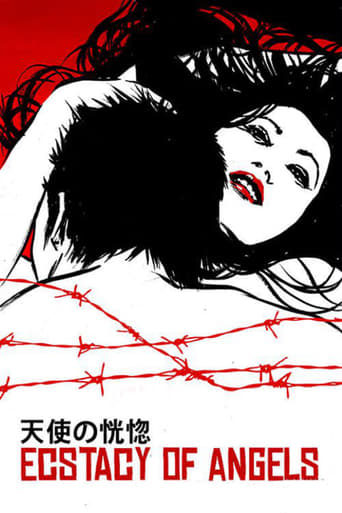insomnia
Koji Wakamatsu's "Ecstacy Of The Angels" runs for a mere eighty-nine minutes. After it ended it felt more like eight nine hours. Wakamatsu, known as the "Pink Godfather" (no, don't ask me why), was a pioneer of the pinku eiga genre. I had never heard the name Wakamatsu before. According to the blurb in the festival guide, "Ecstacy of The Angels" is a parable about a revolutionary organization torn apart by betrayal, its members descending into paranoia, sadism and sexual decadence. It sounded like a plot from an early Godard film, only from a Japanese perspective. This sounded interesting, I thought. It was about as interesting as having a tooth extracted. The opening sequence, in black and white, is set in a nightclub. A female singer screeches absurd lyrics, while at a nearby table three men and a woman sit in silence. Pretty soon though, I couldn't figure out which revolutionary faction was which, and by that time I was beyond caring. The actors don't just speak their lines, the bellow them at each other, as if they were all auditory challenged. In the frequent sex scenes (which are about as erotic as two storefront mannequins coupling), they go through the motions of sexual congress while mouthing absurd platitudes about fighting for the revolutionary cause. Frankly, Wakamatsu is definitely no match for Godard. Which reminds me, I need to visit my dentist for a check up. It'll be less painful all round.
MARIO GAUCI
The third film I have watched from this director is the most skillful but, perhaps, the most exasperating as well: something of a political allegory, the detail is so obscure, however, that one tends not to care about what happens to any of the characters - members (ambiguously named after week-days) of the various terrorist factions (named after months and seasons) involved, and who may or may not be double-crossing one another! As usual, gratuitous sex and excessive violence are the order of the day and, once again, there are haphazard switches to color which serve no discernible function (but who can tell with a film as pretentious as this one?). Still, the final montage of suicidal bombings is notable...and, in any case, this type of art film - however tested one's patience may be by its gross self-indulgence - cannot be objectively criticized, or easily ignored!
tedg
Spoilers herein.I particularly appreciate films whose manner is consistent with its matter. This one is, but the problem is that the overriding notion is deliberate lifelessness. I suppose there is a certain teenage audience for this sort of thing: masochistic narcissism. But once someone has done it -- or even thought about it, it is enough for us all.The idea is life by slogan, by motion. Dry sex. Inherited passion. Emulated life. Confused but committed participants. Pretty tired and tiring stuff. The novelty here is the film is designed the same way as a sort of art-as-politics. Pass on this. It is almost as bad as TeeVee without the plastic giggles.Ted's Evaluation -- 1 of 3: You can find something better to do with this part of your life
peter-209
The film is a dated, incoherent, and pretentious rambling about fictional revolutionary, or rather quasi-revolutionary, terrorist group(s) in Tokyo in the sixties. Although there may be some resemblance to early Godard, Wakamatsu seems to be much less accomplished thinker, revolutionary, or craftsman than the French master of the New Wave. Notwithstanding the typically Asian overacting, all the persons in the "plot" act as detached mechanical puppets (perhaps intentionally?). They are not good in making either revolution or love. The frequent sex scenes were quite irritating not only because the participants recited quasi-political slogans, but also due to sometimes awkward choreography or cuts necessitated by the bizarre Japanese censorship law that does not allow a glimpse of pubic hair on the screen.I wonder if the sign "WEAPON WEARHOUSE" on a weapon warehouse in the film is a joke for insiders or rather a testimony on the level of production values in this movie.


